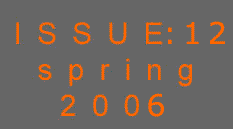 |
 |
Issue No.12 Spring
|
| ENS News |
| ENS Events |
| Member Societies & Corporate Members |
| Three Baltic States
saying “YES” to Nuclear Energy |
YGN Report |
| European Institutions |
| ENS World News |
| A look at the
Promise and Problems of Nuclear Energy |
ENS Members |
| Links to ENS Member
Societies Links to ENS Corporate Members Editorial staff ______________________ |
| _____________________ |
| _____________________ |
 TopSeal 2006 17.9. - 20.9.2006 Olkiluoto, Finland |
| _____________________ |
 TopFuel 2006 22 - 26 October 2006 in Salamanca |
|
|
| |
| Weak Accuracy Goals |
Strong Accuracy Goals |
|
|
Strong Directional Goals |
Partisan Reasoner
|
Intuitive Scientist
|
|
Weak Directional Goals |
Low Motivation
|
Classical Rationality
|
It must be added that, by natural inclination or by training, different people fall into different categories. Given what this e-Bulletin stands for, the reader might expect me to assert now that the anti-nuclear are Partisan Reasoners and that the pro-nuclear are close to the ideal of classical rationality. Wrong: I am quite prepared to admit that the latter are Intuitive Scientists, which is still better than being a Partisan Reasoner. Given the topic of this article, the reader might also expect me to explain why it is not the other way round: the anti-nuclear as Intuitive Scientists and the pro-nuclear as Partisan Reasoners. I could engage in a full-fledged, and therefore lengthy, demonstration of my assertion, but there is a simpler way of meeting the reader’s expectation. It consists in not attempting to do so at all. My advice to those who would question my appraisal is: see for yourself. Read the newspapers, read articles written by opponents of nuclear energy, scour the Internet for arguments in favour of it. Then try to identify instances of the failings listed above. Try also to see where in the above table the authors of the material read fit best. But above all, get acquainted with critical thinking. Type these words in the input box of your favourite search engine if you are not familiar with the concept yet. You will find a wealth of information on how to reason without falling in any of the pitfalls mentioned earlier. It will also teach you how to identify the traps motivated reasoners of all shapes and sizes are laying for you. If I had to emphasise one single characteristic of critical thinking, I would point out that it advocates self-regulation. Critical thinkers define self-regulation as monitoring one’s own cognitive activities, the elements used in those activities and the results deduced from them. This implies practicing self-examination and self-correction2. Critical thinking is therefore about being alert to one’s own potential failings in order to better avoid them. This is a demanding exercise. The stronger the directional goal of the reasoner will be, the weaker will be the incentive to practice a discipline that is likely to stand in the way of the reasoner’s objectives.
It has become fashionable nowadays to underline the environmental dangers threatening us. The fashion has not yet been extended to calling for the compulsory use on all sides of the cognitive tools needed to rise to the challenge. The practice is actually quite the reverse: those who by trade or by natural inclination are more likely to apply sound rules of reasoning are being dismissed as a lobby motivated by vested interests. Critical thinking, not to speak of plain common sense, indicates that an argument should be accepted or dismissed on the basis of its strength or weakness, not according to the affiliation of its author
1 Three Steps toward a Theory of Motivated Political Reasoning, Milton Lodge and Charles Taber, in Elements of Reason, Cognition, Choice and the Bounds of Rationality, Edited by Arthur Lupia, Mathew D. McCubbins and Samuel L. Popkin, Cambridge University Press, 2000.
2 See “Critical Thinking: What it is and Why it Counts” by Peter A. Falcione (can be downloaded from the Internet).
| |



